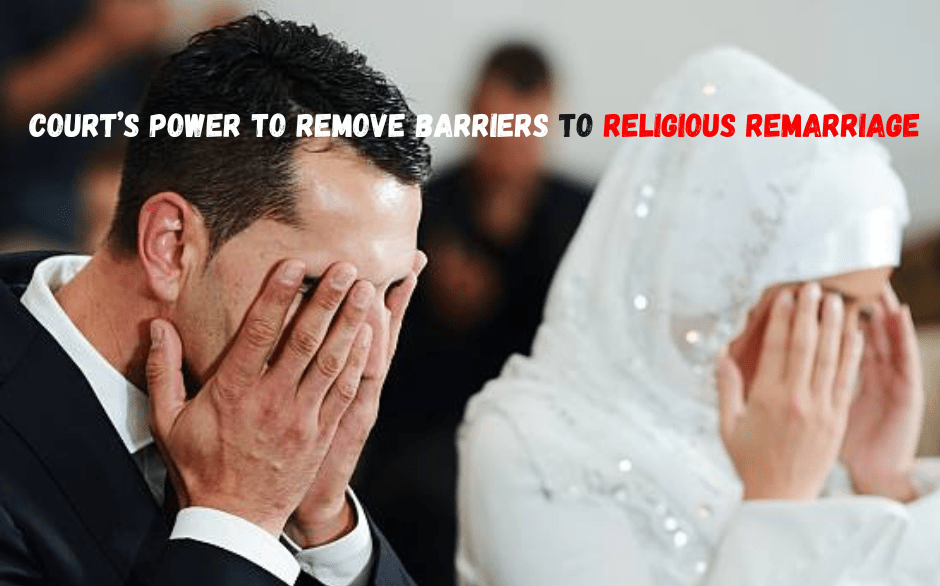
PREAMBLE
In some religions like Islam, a woman cannot re-marry without a religious divorce. Although the Courts do not have the power to order religious divorce in Canada, the Courts have the discretion to refuse to hear a party who fails to remove barriers to the remarriage of a spouse and withholds religious divorce unless that party can satisfy the Court that the spouse has genuine religious or conscientious grounds for refusing to remove the barriers.
LEGISLATION
Section 21.1 of the Divorce Act provides a process for seeking the removal of barriers to religious remarriage as follows:
Affidavit re removal of barriers to religious remarriage
(2) In any proceedings under this Act, a spouse (in this section referred to as the “deponent”) may serve on the other spouse and file with the court an affidavit indicating
(a) that the other spouse is the spouse of the deponent;
(b) the date and place of the marriage, and the official character of the person who solemnized the marriage;
(c) the nature of any barriers to the remarriage of the deponent within the deponent’s religion the removal of which is within the other spouse’s control;
(d) where there are any barriers to the remarriage of the other spouse within the other spouse’s religion the removal of which is within the deponent’s control, that the deponent
(i) has removed those barriers, and the date and circumstances of that removal, or
(ii) has signified a willingness to remove those barriers, and the date and circumstances of that signification;
(e) that the deponent has, in writing, requested the other spouse to remove all of the barriers to the remarriage of the deponent within the deponent’s religion the removal of which is within the other spouse’s control;
(f) the date of the request described in paragraph (e); and
(g) that the other spouse, despite the request described in paragraph (e), has failed to remove all of the barriers referred to in that paragraph.
Powers of court where barriers not removed
(3) Where a spouse who has been served with an affidavit under subsection (2) does not
(a) within fifteen days after that affidavit is filed with the court or within such longer period as the court allows, serve on the deponent and file with the court an affidavit indicating that all of the barriers referred to in paragraph (2)(e) have been removed, and
(b) satisfy the court, in any additional manner that the court may require, that all of the barriers referred to in paragraph (2)(e) have been removed,
the court may, subject to any terms that the court considers appropriate,
(c) dismiss any application filed by that spouse under this Act, and
(d) strike out any other pleadings and affidavits filed by that spouse under this Act.
Special case
(4) Without limiting the generality of the court’s discretion under subsection (3), the court may refuse to exercise its powers under paragraphs (3)(c) and (d) where a spouse who has been served with an affidavit under subsection (2)
- (a)within fifteen days after that affidavit is filed with the court or within such longer period as the court allows, serves on the deponent and files with the court an affidavit indicating genuine grounds of a religious or conscientious nature for refusing to remove the barriers referred to in paragraph (2)(e); and
- (b)satisfies the court, in any additional manner that the court may require, that the spouse has genuine grounds of a religious or conscientious nature for refusing to remove the barriers referred to in paragraph (2)(e).
REASON FOR SEEKING REMOVAL OF BARRIERS
As noted earlier, in some religions like Islam, a woman is prevented from remarrying without a religious divorce. Also, in some countries, if a woman travels to her country of origin without a religious divorce, her passport may be revoked and she may be restrained from leaving her country.
WHEN TO INITIATE THE PROCESS FOR REMOVAL?
The Courts have found that the process for removing barriers to religious remarriage should be initiated before trial because the remedy provided in the Divorce Act is to strike pleadings in the event of non-removal of barriers. The Court does not have the power to make an order requiring a party to grant a religious divorce. Once the issues under the Act are resolved or finalized, the spouse who seeks a religious divorce may not have a remedy available.
Of note, s. 21.1 of the Divorce Act does not apply where the power to remove the barrier to religious remarriage lies with a religious body or official.
CONCLUSION
Religious divorce and religious remarriage become complicated when it intersects with civil law. Therefore, proper, relevant, and prompt legal steps are required to remove barriers to religious remarriage. If you need help with your Divorce or any Family Law issue, you may contact IQBAL LAW as we are well conversant with civil law and religious divorce.